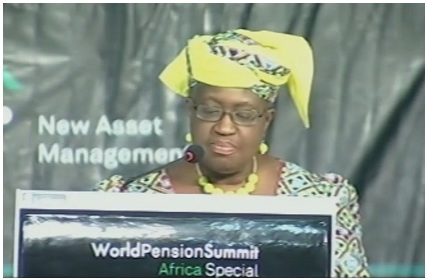
At the opening of the World Pension Summit, Africa Special on Monday, Dr Okonjo-Iweala called on African countries to switch to the Contributory Pension Scheme currently operational in Nigeria, which she said had immense benefits.
She stressed the need to improve pension fund contribution among the working class in African countries, advising public and private companies to key into the contributory scheme.
“We are happy to have this Africa Pension Summit because the contribution of African pension funds to the growth of Africa’s economies is still rather low. It is a low percentage of the GDP in many countries but it is improving.
“We need to capture a significant proportion of our workforce especially those in the income sector into our pension systems. We need to encourage countries to switch to the contributory pension scheme,” she said, stressing that the huge long-term funding gaps in infrastructure development could be addressed with such funds.
Review Of Laws And Regulations
Infrastructure financing in Nigeria is still seen largely as part of government’s responsibility and the trend in government’s budgets demands that pension funds and other sources of funds should be considered for this kind of investible pool.
The Finance Minister further advocated a review of regulations and laws governing the investment of pension funds, explaining that Nigeria had started the review of the laws and regulations.
“We are looking at strengthening several aspects of the law, part of which is the strengthening of the punitive aspect to check misappropriation and mismanagement of the funds.
“The reform will give more flexibility so that we can use our resources as a good investible pool of savings.
“With over 70 trillion dollars in asset in 2013, institutional investors like pension funds have the muscle to invest in real productive assets and to drive growth. They even have the muscle now to decide the nature of the investment,” she pointed out.
Protection Of Pension Assets
Nigeria transited from pension deficit of about 2 trillion Naira (about 12.9 billion dollars) in 2004 to accumulate pension assets of over 4.21 trillion Naira (about 27.2 billion dollars) by March 2014.
In his speech at the opening of the two-day summit, President Goodluck Jonathan made it clear that the protection of pension funds’ retirement benefits remains top priority of his administration.
“Pension as globally recognised occupies a strategic place in national socio-economic development. It is not only a vital component of social security but also a veritable vehicle for nation building. Indeed, investment in pension has profound impact on the well-being of pensioners, the society and the economy at large” he said.
President Jonathan advised stakeholders in the life shaping industry to engage constantly in dialogue to foster management framework and practices in their respective jurisdiction.
“In 10 years of sustained policy innovation and meticulous management, these have facilitated confidence and credibility in our pension system and administration.
“The protection of pension assets for the payment of retirement benefit as and when due should always be our paramount objective,” he further told the gathering.
President Jonathan expressed confidence that participants at the summit would seize the ample opportunity offered by the inaugural World Pension Summit, Africa Special to reflect and share experiences on how best to fine-tune Africa’s pension system to globally acceptable standards while retaining tailored and unique adaptations.


